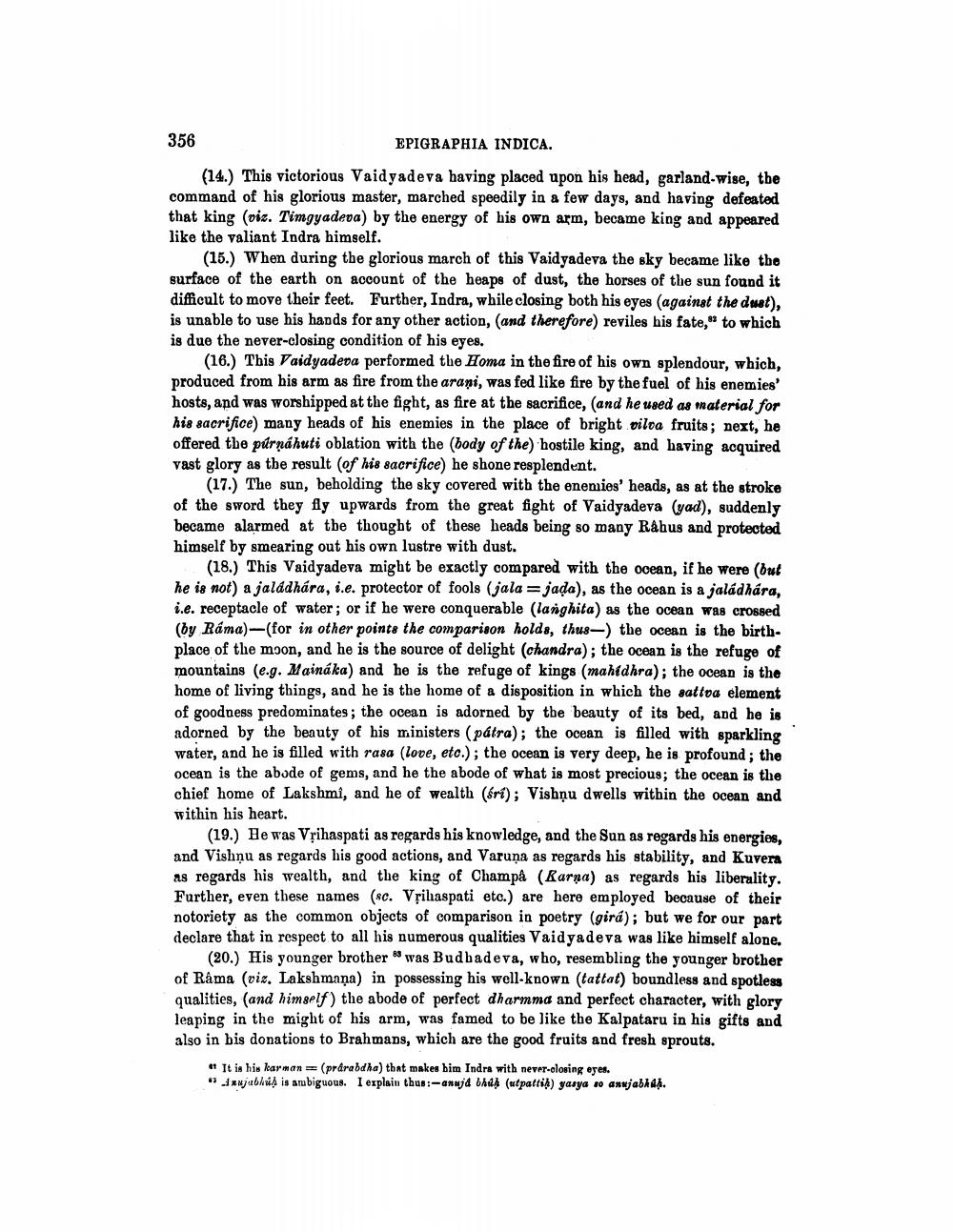________________
356
EPIGRAPHIA INDICA. (14.) This victorious Vaidyadeva having placed upon his head, garland-wise, the command of his glorious master, marched speedily in a few days, and having defeated that king (viz. Timgyadeva) by the energy of his own arm, became king and appeared like the valiant Indra himself.
(15.) When during the glorious march of this Vaidyadeva the sky became like the surface of the earth on account of the heaps of dust, the horses of the sun found it difficult to move their feet. Further, Indra, while closing both his eyes (against the dust), is unable to use his hands for any other action, and therefore) reviles his fate, to which is due the never-closing condition of his eyes.
(16.) This Vaidyadeva performed the Homa in the fire of his own splendour, which. produced from his arm as fire from the arani, was fed like fire by the fuel of his enemies' hosts, and was worshipped at the fight, as fire at the sacrifice, (and he waed as material for his sacrifice) many heads of his enemies in the place of bright vilda fruits; next, he offered the púrnáhuti oblation with the body of the) hostile king, and having acquired vast glory as the result (of his sacrifice) he shone resplendent.
(17.) The sun, beholding the sky covered with the enemies' heads, as at the stroke of the sword they fly upwards from the great fight of Vaidyadeva (yad), suddenly became alarmed at the thought of these heads being so many Rabus and protected himself by smearing out his own lustre with dust.
(18.) This Vaidyadeva might be exactly compared with the ocean, if he were (but he is not) a jaládhára, i.e. protector of fools (jala=jada), as the ocean is a jaládhára, i.e. receptacle of water; or if he were conquerable (langhita) as the ocean was crossed (by Ráma)-(for in other points the comparison holds, thus-) the ocean is the birthplace of the moon, and he is the source of delight (chandra); the ocean is the refuge of mountains (e.g. Maináka) and he is the refuge of kings (mahídhra); the ocean is the home of living things, and he is the home of a disposition in which the sattoa element of goodness predominates; the ocean is adorned by the beauty of its bed, and he is adorned by the beauty of his ministers (pátra); the ocean is filled with sparkling water, and he is filled with rasa (love, etc.); the ocean is very deep, he is profound; the ocean is the abode of gems, and he the abode of what is most precious; the ocean is the chief home of Lakshmi, and he of wealth (śrí); Vishņu dwells within the ocean and within his heart.
(19.) He was Vțihaspati as regards his knowledge, and the Sun as regards his energies, and Vishnu as regards his good actions, and Varuna as regards his stability, and Kuvera as regards his wealth, and the king of Champà (Rarna) as regards his liberality. Further, even these names (sc. Vșihaspati etc.) are here employed because of their notoriety as the common objects of comparison in poetry (gira); but we for our part declare that in respect to all his numerous qualities Vaidyadeva was like himself alone.
(20.) His younger brother was Budbadeva, who, resembling the younger brother of Rama (viz. Lakshmaņa) in possessing his well-known (tattat) boundless and spotless qualities, (and himself) the abode of perfect dharmma and perfect character, with glory leaping in the might of his arm, was famed to be like the Kalpataru in his gifts and also in bis donations to Brahmans, which are the good fruits and fresh sprouts.
It is his karman = (prarabdha) that makes bim Indra with never-closing oyes. .. wjabhuis is anbiguous. I explain thus:-onujd bhd (utpattib) yasya to ansjabb.




